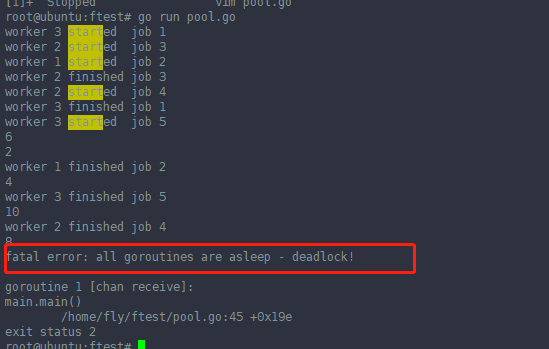原文:https://gobyexample.com/worker-pools
Our running program shows the 5 jobs being executed by various workers. The program only takes about 2 seconds despite doing about 5 seconds of total work because there are 3 workers operating concurrently.
package main
import (
"fmt"
"time"
)
func worker(id int, jobs <-chan int, results chan<- int) {
for j := range jobs {
fmt.Println("worker", id, "started job", j)
time.Sleep(time.Second)
fmt.Println("worker", id, "finished job", j)
results <- j * 2
}
}
func main() {
const numJobs = 5
jobs := make(chan int, numJobs)
results := make(chan int, numJobs)
for w := 1; w <= 3; w++ {
go worker(w, jobs, results)
}
for j := 1; j <= numJobs; j++ {
jobs <- j
}
close(jobs)
for a := 1; a <= numJobs; a++ {
<-results
}
}
下面这个版本为什么会死锁呢??
package main
import "fmt"
import "time"
// Here's the worker, of which we'll run several
// concurrent instances. These workers will receive
// work on the `jobs` channel and send the corresponding
// results on `results`. We'll sleep a second per job to
// simulate an expensive task.
func worker(id int, jobs <-chan int, results chan<- int) {
for j := range jobs {
fmt.Println("worker", id, "started job", j)
time.Sleep(time.Second)
fmt.Println("worker", id, "finished job", j)
results <- j * 2
}
}
func main() {
// In order to use our pool of workers we need to send
// them work and collect their results. We make 2
// channels for this.
jobs := make(chan int, 100)
results := make(chan int, 100)
// This starts up 3 workers, initially blocked
// because there are no jobs yet.
for w := 1; w <= 3; w++ {
go worker(w, jobs, results)
}
// Here we send 5 `jobs` and then `close` that
// channel to indicate that's all the work we have.
for j := 1; j <= 5; j++ {
jobs <- j
}
close(jobs)
// Finally we collect all the results of the work.
//for a := 1; a <= 5; a++ {
// fmt.Println( <-results)
//}
for v := range results {
fmt.Println(v)
}
}

——————————————————————————————————————————————————————————
|
In this example we’ll look at how to implement a worker pool using goroutines and channels. |
|
 
package main
|
|
import (
"fmt"
"time"
)
|
|
|
Here’s the worker, of which we’ll run several concurrent instances. These workers will receive work on the |
func worker(id int, jobs <-chan int, results chan<- int) {
for j := range jobs {
fmt.Println("worker", id, "started job", j)
time.Sleep(time.Second)
fmt.Println("worker", id, "finished job", j)
results <- j * 2
}
}
|
func main() {
|
|
|
In order to use our pool of workers we need to send them work and collect their results. We make 2 channels for this. |
const numJobs = 5
jobs := make(chan int, numJobs)
results := make(chan int, numJobs)
|
|
This starts up 3 workers, initially blocked because there are no jobs yet. |
for w := 1; w <= 3; w++ {
go worker(w, jobs, results)
}
|
|
Here we send 5 |
for j := 1; j <= numJobs; j++ {
jobs <- j
}
close(jobs)
|
|
Finally we collect all the results of the work. This also ensures that the worker goroutines have finished. An alternative way to wait for multiple goroutines is to use a WaitGroup. |
for a := 1; a <= numJobs; a++ {
<-results
}
}
|
|
Our running program shows the 5 jobs being executed by various workers. The program only takes about 2 seconds despite doing about 5 seconds of total work because there are 3 workers operating concurrently. |